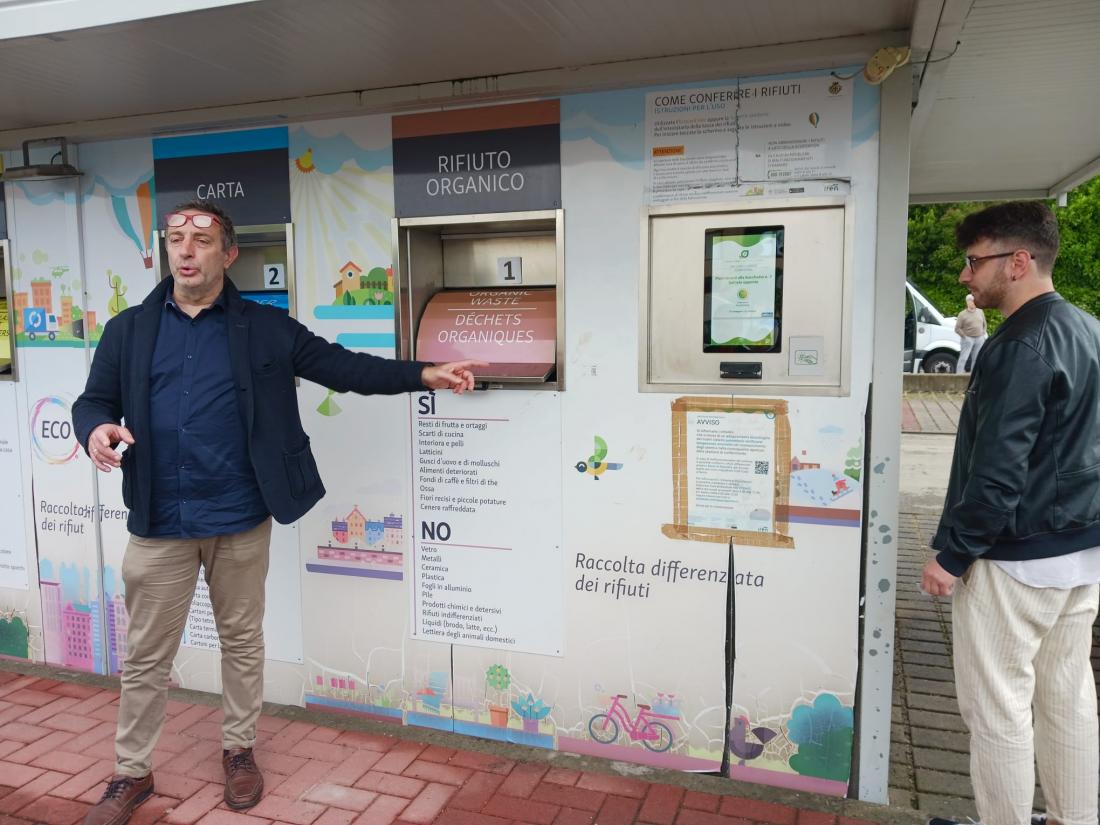Waste management, circular economy, citizen involvement: MED-InA partners discover some best practices in Italy

82% of waste is recycled in Parma, 9,000 tonnes of CO2 emissions saved in Milan thanks to an efficient system of waste management! A study visit organised in May 2023 allowed the MED-InA partners to discover the best practices of two Italian cities at the forefront of waste reduction and management.
MED-InA partners went on a study visit to Milan and Parma, organized by AViTeM and Zero Waste Europe, to get inspiration from two cities that have remarkably reduced their residual waste production in a couple of decades.
16 participants from France, Jordan, Lebanon, Spain and Tunisia benefitted from a study tour that made them witness waste sorting systems on the ground, waste collection and treatment plants, and meet with the local waste management authorities, both private and public.
“In Carcaixent, we have a very different waste collection system. Recently, we have introduced organic waste collection, but we have experienced a lot of problems... We want to learn from the experience and expertise of Milan and Parma to improve our situation!” Francesc J. Salom – Mayor of Carcaixent (Spain)
The objectives of this field visit were:
· - To enable MED-InA partners, especially pilot municipalities, to meet with waste management stakeholders and professionals, in a peer-to-peer learning experience allowing for mutual exchange
· - To give MED-InA pilot municipalities inspiring operational and organisational examples of how zero waste policies and strategies can be thought and implemented in differently challenging contexts such as densely populated urban areas and/or middle-sized cities and reflect on the extent to which it can be replicated in their own working environment.
· - To enable participants to observe and experience the full cycle of waste management (from collection to processing, transformation, recycling and/or reuse), visiting facilities and equipment in the selected areas.
On May 10, MED-InA participants went boots on the ground to visit separate collection in Milan during operations, including the way it operates high-rise, densely populated buildings, under guidance from Zero Waste Europe and AMSA (Milan waste management company), before attending a deep-dive technical session led by AMSA with the presentation of Milan’s waste management strategy and relevant policies implemented by the city. Milan, whose population is 1.4M, is ranking on top of recycling rates in cities above 1M inhabitants in Europe, thanks above all to collection of organics, implemented since 2012, and which covers 100% of the population
Later that day, the visit carried on in the Lacchiarella composting site, with a technical visit to a local anaerobic digestion/composting centre recently opened to service Milan and neighbouring areas.
"In Milan, we have noticed how effective the efforts and infrastructures to achieve zero waste are. In Jordan, regulations, strategies and policies have recently been adopted to improve waste management, but we’re struggling to reach this stage. I think this is a package of social economic, regulatory and administrative approaches that should work hand in hand to achieve the zero waste objectives." Eng. Reham Jammal – Greater Irbid Municipality (Jordan)
On May 11, MED-InA partners went to witness Parma’s separate collection system during operations, including organic waste & other fractions, before a mentoring session with Mr Gianluca Borghi, Parma Deputy Mayor in charge of waste management, including a presentation by officials and followed by an exchange session.
The day then ended with a visit to RECAP, Parma’s material recovery site that sorts plastics, carton and paper.
“82% of waste is recycled in Parma”!
Gianluca Borghi, Parma Deputy Mayor in charge of waste management explains: “For the last 10 years, the city of Parma has been collecting separated household waste with a door-to-door system. In 2023, 82% of waste is recycled in Parma and the annual household waste tax for a family of 4 people is 200€ maximum per year, which is much lower than in other cities in the Region.”
According to the Deputy Mayor the main key factor of the successful Parma example is “the synergy among the local administration vision, the citizen involvement and the commitment of social enterprises on the operational aspects”. Completely in line with Medina project framework.
MED-InA participants went back to their cities inspired and full of ideas to implement and adapt to their context!
“We're leaving Italy with tactics to get citizens more involved in waste collection and a range of good practices to adapt to our municipality and local context!” Eng. Reham Jammal – Greater Irbid Municipality (Jordan)









